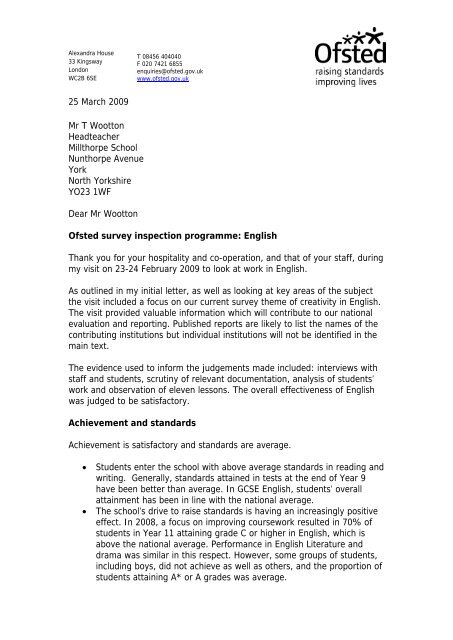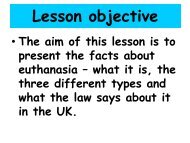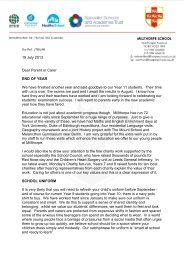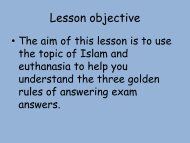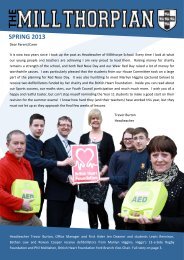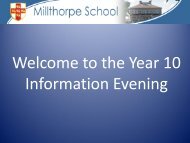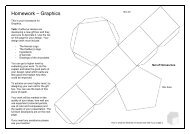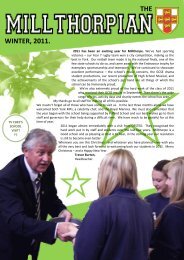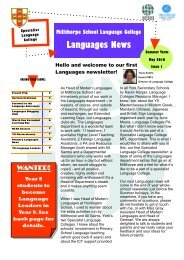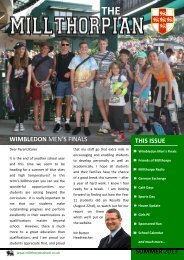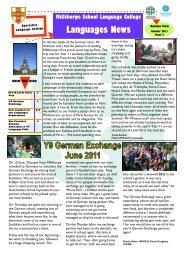23/02/2009 Report - Millthorpe School York
23/02/2009 Report - Millthorpe School York
23/02/2009 Report - Millthorpe School York
Create successful ePaper yourself
Turn your PDF publications into a flip-book with our unique Google optimized e-Paper software.
Alexandra House<br />
33 Kingsway<br />
London<br />
WC2B 6SE<br />
T 08456 404040<br />
F <strong>02</strong>0 7421 6855<br />
enquiries@ofsted.gov.uk<br />
www.ofsted.gov.uk<br />
25 March <strong>2009</strong><br />
Mr T Wootton<br />
Headteacher<br />
<strong>Millthorpe</strong> <strong>School</strong><br />
Nunthorpe Avenue<br />
<strong>York</strong><br />
North <strong>York</strong>shire<br />
YO<strong>23</strong> 1WF<br />
Dear Mr Wootton<br />
Ofsted survey inspection programme: English<br />
Thank you for your hospitality and co-operation, and that of your staff, during<br />
my visit on <strong>23</strong>-24 February <strong>2009</strong> to look at work in English.<br />
As outlined in my initial letter, as well as looking at key areas of the subject<br />
the visit included a focus on our current survey theme of creativity in English.<br />
The visit provided valuable information which will contribute to our national<br />
evaluation and reporting. Published reports are likely to list the names of the<br />
contributing institutions but individual institutions will not be identified in the<br />
main text.<br />
The evidence used to inform the judgements made included: interviews with<br />
staff and students, scrutiny of relevant documentation, analysis of students’<br />
work and observation of eleven lessons. The overall effectiveness of English<br />
was judged to be satisfactory.<br />
Achievement and standards<br />
Achievement is satisfactory and standards are average.<br />
<br />
<br />
Students enter the school with above average standards in reading and<br />
writing. Generally, standards attained in tests at the end of Year 9<br />
have been better than average. In GCSE English, students’ overall<br />
attainment has been in line with the national average.<br />
The school’s drive to raise standards is having an increasingly positive<br />
effect. In 2008, a focus on improving coursework resulted in 70% of<br />
students in Year 11 attaining grade C or higher in English, which is<br />
above the national average. Performance in English Literature and<br />
drama was similar in this respect. However, some groups of students,<br />
including boys, did not achieve as well as others, and the proportion of<br />
students attaining A* or A grades was average.
Achievement has been broadly satisfactory overall over recent years.<br />
Efforts to overcome obstacles to good achievement have become more<br />
strategic and effective in the current year. As a result, the progress<br />
being made by students in Key Stages 3 and 4 is now improving<br />
rapidly.<br />
This is reflected in the good quality of many students’ work and<br />
contributions to lessons, and in the department’s careful tracking which<br />
shows accelerating and generally good progress by students across the<br />
age range.<br />
Quality of teaching and learning of English<br />
Teaching and learning have improved and are currently good.<br />
<br />
<br />
<br />
<br />
<br />
<br />
Teaching seen during the inspection was generally good and<br />
sometimes outstanding.<br />
Strengths observed include good use of simple learning objectives<br />
which help students to understand and evaluate particular skills.<br />
Teachers used varied resources – including smartboards and dramatic<br />
scenarios - in imaginative ways which prompted students to think<br />
independently and increased their confidence in speaking and listening.<br />
In lessons that were satisfactory, activities were not well enough<br />
planned to ensure that the full range of students made good progress<br />
towards the objectives.<br />
In the best lessons seen, teachers’ planning built very effectively on<br />
good knowledge of what the full range of students in the class could<br />
already do. Teachers anticipated obstacles to progress and adapted<br />
activities to suit. They provided high challenge and good opportunities<br />
for independent learning. As a result, students’ work was individual,<br />
creative and reached the objectives set. In such lessons, students’<br />
attitudes to learning were very good.<br />
Marking, and students’ self assessment, usually follows clear criteria<br />
and recognises specific achievements. Guidance is increasingly<br />
effective, although students are sometimes unclear about the next<br />
steps to improve their skills. Older students really like the practice<br />
established in some classrooms of individual discussions with their<br />
teacher about how to improve.<br />
Quality of curriculum<br />
The curriculum in English is good.<br />
<br />
<br />
Nearly all students in Key Stage 4 are entered for GCSE in English and<br />
English Literature. They have the further option of taking drama and<br />
media studies is also being introduced.<br />
The Key Stage 3 curriculum offers good breadth, including drama. It<br />
has been reshaped this year to focus on key skills, giving teachers<br />
more freedom to decide how these will be learned. This is a work in
progress but, where embedded, is working well. There is a growing<br />
emphasis on realistic contexts: for example, a Year 8 class is writing a<br />
book of short stories which will be placed in local doctors’ waiting<br />
rooms. Students’ preferences and teachers’ expertise are influencing<br />
content. Particularly in Year 7, where new schemes are best<br />
established, these developments are contributing to better progress<br />
across classes.<br />
A “buddy” scheme linking English teachers with colleagues in other<br />
subjects has led to collaborative planning for learning about, for<br />
example, the historical context of the film “The Boy in the Striped<br />
Pyjamas” and poetry from the First World War.<br />
Students have good opportunities to get involved in high quality<br />
performance, as their production of “Masquerade” in a local theatre<br />
vividly illustrated. A recent well-targeted enrichment day has had a<br />
positive response from Year 11 students.<br />
Leadership and management of English<br />
Leadership and management are good.<br />
<br />
<br />
<br />
<br />
<br />
<br />
The new head of English, appointed in September, has moved the<br />
subject forward significantly, with good support from the senior<br />
leadership team and the local authority.<br />
His well-informed vision and passion for the subject have given it a<br />
strong identity in students’ eyes and he is inspiring new confidence in<br />
the department. Colleagues work together to develop new schemes of<br />
work, using their good range of expertise, and say they have been<br />
supported to learn new skills and take creative risks. Examples of<br />
exciting teaching are shared in every department meeting.<br />
Self-evaluation is accurate in identifying areas of weaker performance<br />
and has led to a relevant plan for improvement. Performance targets<br />
and professional development are aligned well with specific goals.<br />
Regular, moderated assessment, work scrutiny, spot checks on<br />
students’ understanding of what they are learning, and consultation<br />
with students are all used to discover what is working well. Where<br />
necessary, interventions follow swiftly and are monitored closely.<br />
All this has improved consistency in assessment and is improving<br />
teachers’ effectiveness in promoting good progress.<br />
While these changes have only begun to have impact on examination<br />
results, students’ progress, work and attitudes clearly indicate<br />
improvement.<br />
Creativity in English<br />
Creativity is at the heart of the vision for English and is embedded in new<br />
programmes of study. The emphasis on skills is freeing teachers to be<br />
creative and take risks, producing some exciting lessons. Realistic contexts for<br />
speaking and listening stimulate independent learning: the quality of
collaborative talk in a Year 7 class, for example, was impressive. A Year 10<br />
lesson expertly illustrated how to avoid spoon-feeding an interpretation of<br />
poetry, by leading groups of students into open-ended, exploratory<br />
discussion. This led to individual and insightful writing about how the poet<br />
had communicated to them. Students are beginning to use new technology to<br />
communicate, for example, through recording podcasts conveying their<br />
response to a poem or presenting their research in audio visual form. These<br />
approaches are working well for both boys and girls.<br />
Areas for improvement, which we discussed, included:<br />
<br />
<br />
raising overall achievement by ensuring sustained good progress by all<br />
groups of students<br />
developing further teachers’ confidence in planning to ensure different<br />
students meet the learning objectives, and in helping students to<br />
understand how to develop their skills.<br />
I hope these observations are useful as you continue to develop English in the<br />
school.<br />
As I explained in my previous letter, a copy of this letter will be sent to your<br />
local authority/Local Learning Skills Council. All feedback letters will be<br />
published on the Ofsted website at the end of each half-term and made<br />
available to the team for the next institutional inspection.<br />
Yours sincerely<br />
Susan Bowles<br />
Her Majesty’s Inspector


